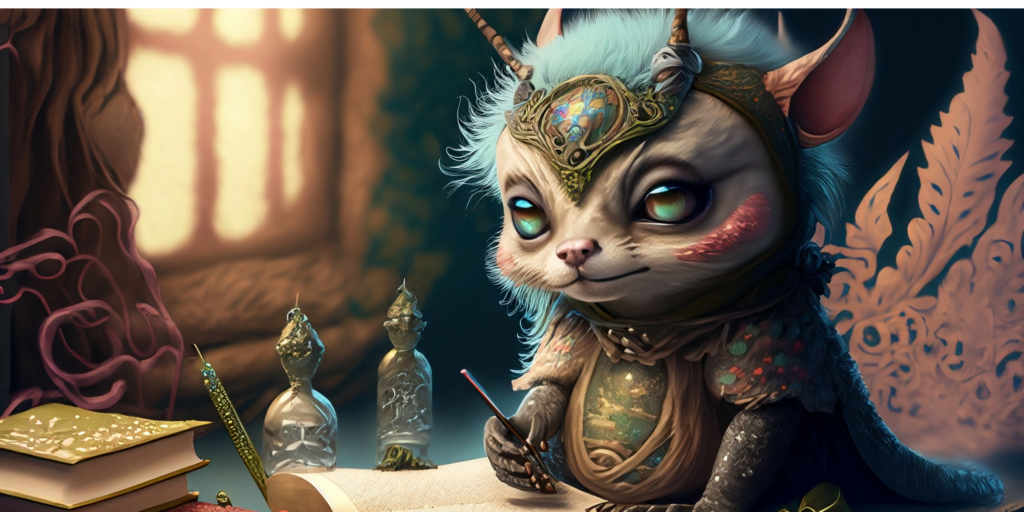Our spring submission cycle starts on March 1, and for the last two months the editorial board here at MetaStellar has been discussing AI-generated stories.
Should we accept them? Should be ban them? Should we go with something in the middle?
We decided to accept them. There are lots of reasons not to, and plenty of other science fiction and fantasy publications are taking that route.
But, for both practical and philosophical reasons, we decided that we will allow our contributors to use AI to help them craft their stories.
Here’s why.

Our primary mission is to serve our readers
If a story is good, it’s good. Our readers deserve to get the best possible writing, and the most interesting and engaging stories. It shouldn’t matter whether those stories were created with the help of AI, or with a squad of monkeys hammering away at typewriters, or with the help of psychedelic drugs.
What matters is the result.
Our secondary mission is to serve our writers
We launched MetaStellar in the summer of 2020, in the middle of the pandemic, a group of new and hopeful sci-fi and fantasy authors and editors who were concerned by the small number of beginner-welcoming publications in the space. In particular, we wanted to launch a publication that would publish as many new voices as possible, and make all the stories free, online and easy for writers to share with their readers.
We’ve since published works by more than 300 different writers. They are our community. We aim to support them.
If some of them use AI to help them research their stories, clean up their grammar, generate story ideas or plot outlines, or even to write drafts of entire scenes — well, we support them, too.
Generative AI is particularly helpful for those who struggle to put their ideas into words. People who are struggling with the English language, for example, for one reason or another. People struggling with writer’s block. People who know what they want to say, but just can’t get the words out.
These are the philosophical reasons why we decided to embrace AI.
But there are also practical reasons for doing so.

There’s no way to detect AI content
All the AI detectors out there are bad.
Even the best ones fail if you simply ask ChatGPT to vary the length of sentences and the level of complexity of your paragraphs.
OpenAI itself, the maker of ChatGPT, has released an AI detector — and it only detects AI-generated text 26 percent of the time, the company itself admitted.
Worse yet, when looking at completely human-written text, it classifies it as AI-generated 9 percent of the time. We never want to be in a position of rejecting a good story because an AI detector said it’s written by AI, only to find out that it was written by a human.
Even if the AI detectors improve, many people use AIs as just a part of their writing process. They might use it to brainstorm ideas, for example, to fix grammar, or to write rough drafts of scenes that they then completely rewrite in their own voice.
There is absolutely no way to check for that.
AI is everywhere. Where do you draw the line?
Speaking of all the different ways in which writers use AI, where do you draw the line on what is permitted and what isn’t?
Obviously, using AI-powered search is okay. We all use Google. Nobody’s talking about banning Google.
Or AI-powered grammar checkers. Everyone uses Grammarly or the AI tools build into Microsoft Word and Google Docs.
What about AI-powered dictation and transcription tools? Here at MetaStellar, several of us are big fans of Otter AI.
What about character generators, name generators, idea generators? There are AI-powered versions of all of those. Are they okay?
What about AI-powered outlining tools? You can ask ChatGPT to create a detailed outline of a story, for example. You can have it write the story based on the ideas you provide, or you can ask ChatGPT to come up with its own ideas. Is that okay?
What about AI-generated rough drafts? Is it okay if the writer takes an AI-generated piece of writing, then rewrites it completely in their own voice?
What about if a writer uses the AI to write the whole story, but in the process spends days, or weeks, working with the AI to tweak the plot, to get the details of the setting just right, to evolve the characters, to tailor the writing style? Should the effort that goes into a story count? Does it even matter? If an author whips off a brilliant piece of work in an hour, an another author spends weeks slaving over a story that’s really not all that good, is the one that took a lot of work worthier than the one created quickly? That’s probably a question for the philosophers.

Is AI more like steroids, or more like music synthesizers?
We’ve heard AI-generated writing equated to sports stars using steroids and other performance-enhancing drugs. It’s not fair to the other competitors. Do we, as a public, want to be wasting our time watching cheaters? No, of course not.
On the other hand, AI could also be compared to music synthesizers. Musicians who have spent years or decades learning to play the violin might be understandably miffed when someone can play a perfect tone just by pressing a button. People pay to watch classical orchestras play traditional instruments — but they also pay to watch people play synthesizers. And if the music was recorded in a studio, then who even knows what instruments were actually used.
If AI is like steroids, then sure, we should definitely ban it. It’s not fair to the honest writers who do all the writing themselves.
If AI is more like music synthesizers, then we should try to be open-minded. Just as we let musicians use whatever instrument is most appropriate for the type of music they’re performing, we should let writers choose where and when to use AI, and how much of it to use.
Outside of writing competitions, writing is not a competitive sport.
In writing competitions, each competition should set its own rules.
Here at MetaStellar, when we submit stories we published to competitions, we will check with the author to ensure that the story is written in a way that follows the guidelines of that particular competition. If they lie about it — well, we’re not sure what we can do. We’ll do the best we can, then leave it up to the competition organizers to figure out the rest.
How to submit an AI-assisted story to us
Just submit it by visiting this page between March 1 and March 31.
You don’t have to tell us how you wrote it. And unless we then submit it to a competition that includes AI restrictions in its guidelines, we won’t ask.
However, writers can feel free to add text to their bios saying that, for instance, their stories are completely written by a human, or written with AI help, or dictated to them by talking mushrooms. We won’t judge.
Our spring submission cycle for original fiction begins on March 1 and ends on March 31. We notify writers in mid-April if the story has been accepted, and pay 8 cents per word. Only submit one story per submission cycle, and, if you are one of our judges, skip this cycle.
We can use a pen name when we publish your story, but make sure that you put your real name on the submission itself, so we can have a legal contract and send out your payment.
We also have year-round submissions for reprints and excerpts. We do not pay for reprints or excerpts, but, on the other hand, our acceptance rate is much, much higher. Plus, you can put promotional stuff in your author bio box, such as links to your Amazon author page or the purchase link to your latest book or your newsletter signup page or your social media links. And if we publish an excerpt from your book, we’ll include a paragraph at the bottom with information about where people can buy the entire book. Think of it as a free ad for your writing.
What qualifies as a reprint or excerpt? Anything that’s been published before, anywhere. Whether it was a school newsletter, or a big-five publisher, or another magazine, or even your own website or Facebook account. If it’s available anywhere else, we consider it a reprint. And yes, you can submit as many reprints and excerpts as you like.




Love your statement about AI, its application to writing, and why you accept AI-assisted or AI-written stories. You make points I had not considered. Alas, I don’t use it. I write the old-fashioned way that Ray Bradbury taught me with the following, which I paraphrase: “You as a writer are a prism gathering the white light of experience, and in turn throwing your spectrum onto the page.”
I don’t use AI to write my books or stories, either — as of right now, at least, except for the usual stuff like grammar checkers — but I’m following the technology closely. Partly because it’s my day job, and partly because the world is changing and I’m too young to retire.
Over the past year, OpenAI has signed a bunch of contracts with content companies, like Associated Press, to get legal training data. Adobe has trained its AI 100% on fully licensed data (and is already paying artists – the first payment went out last September). And we still have the lawsuits that are playing out, and, possibly, new regulations as well. So, eventually, I think the ethical and legal sides will be resolved, one way or the other.
But, for writers, using ChatGPT (or Claude 2, or any of the alternatives) to generate publishable text is still a VERY labor-intensive process. If you just put in a simple prompt, you’ll get a simple results that reads like a summary of a Wikipedia article or a children’s story, moral and all. It’s not readable, and not publishable. To get it to turn out something useful takes hours, even weeks, of massaging the prompts. Some writers even create their own fine-tuned models by turning their past work into training data sets in the form of JSON files — by that point, you’re practically a data scientist. Most just use it for brain-storming, grammar fixing, rewording, and suggesting rough drafts of paragraphs that they then extensively rewrite.
Hardly seems worth the effort, right?
But the thing is, the tools are getting better and more user-friendly all the time. I don’t know what’s going to happen to my profession, or whether I’m going to have a job in five years. Or even one year.
If we’re lucky, AI will do to writing what it did to chess — a few moments of panic, then a net positive. Computer chess allowed players from disadvantaged backgrounds to hone their skills. The internet allowed them to play against each other. Nobody wants to watch a computer play — but everyone wants to watch humans play. Chess has never been as visible or as profitable.
Maybe we’ll do something similar with writing. We’ll have YouTube channels where we discuss our process. Where our audience can watch us hand-write our books and then revise them. Where we read our stories out loud. It might force us to move away from formulaic mass-produced page-turners and more to more quirky, more interesting, more personal narratives. It might make us become better, more thoughtful writers. That’s my hope, anyway.